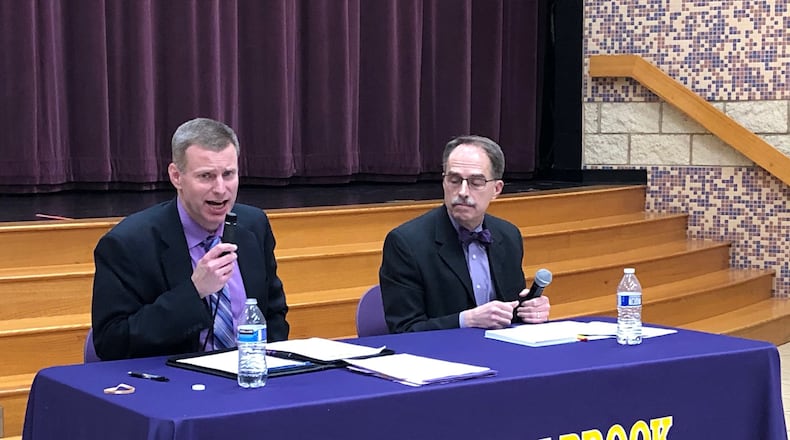“This is a big win for the public and for government transparency, and it sends a strong message that our elected officials will be punished if they don’t follow the law,” said Stafford, who has fought the district over school levies the past two years.
After this newspaper requested comment from Bellbrook Superintendent Doug Cozad and school board President David Carpenter, Cozad said the district accepted the ruling.
“We respect the law and the decision made by our courts,” Cozad said. “The court has interpreted these as technical violations but there was no inappropriate intent associated with these actions. We have taken measures to prevent any further technical violations.”
Wolaver ruled that board members’ text and email discussions from April 19-22, 2019, regarding a May 2019 pro-school levy postcard, “contain sufficient discussion and deliberation to constitute a meeting under the (Open Meetings Act).”
The ruling says then-board member Kathy Kingston solicited input from other board members, and Cozad emailed the other four board members, asking them to send Kingston their thoughts on a draft letter to the community.
The ruling says board members Carpenter, Mary Frantz, and then-board member Elizabeth Betz responded, and after some back-and-forth over the content, the result was a $2,008 expenditure to mail 6,500 postcards to district residents.
Wolaver ruled that five other text and email communications among board members that Stafford questioned did not qualify as “deliberation of public business,” and therefore were not violations.
Wolaver also ruled that the school board went into closed executive session improperly six times in 2018 and 2019. Ohio law lists very limited reasons why a school board, city council or other public body can meet behind closed doors.
As no members of the public are present in those sessions, and they are not recorded, Ohio residents can only trust that public bodies limit discussions to approved topics once inside.
But these violations were based on the reasons the Bellbrook-Sugarcreek school board listed publicly for holding an executive session.
In three instances, the board said it was going into executive session at least in part to discuss goals or evaluations of the superintendent and treasurer, which are not approved purposes for closed sessions.
Other violations were for more technical reasons, such as simply using the term “personnel” rather than properly specifying whether the board was considering the hiring or discipline or dismissal of staff.
Open meetings law violations call for a $500 civil forfeiture to be paid to the person who raised the complaint, plus court costs and attorney’s fees. And any action the board took as a result of an improper meeting is ruled invalid.
Wolaver ruled the board must pay $3,000 plus court costs to Stafford for the violations, but that’s not the final step.
“The court will hold a separate hearing on reasonable attorney fees as required by (Ohio law) and to determine what, if any formal actions were taken as a result of the (improperly called) May 9, 2019 executive session,” Wolaver wrote.
Stafford said given the Open Meetings Act injunction that was part of Wolaver’s ruling, if school board members violate the Act again, they could be removed from office. He said he wished the board had not pursued the lengthy court case.
“While I am glad to have an injunction issued, it is a sad day in Bellbrook that so much funding was wasted on legal fees that could have been used to educate children in the district, especially when the school board keeps asking for a tax increase,” he said.
About the Author

